|
|
|
Sort Order |
|
|
|
Items / Page
|
|
|
|
|
|
|
| Srl | Item |
| 1 |
ID:
180005
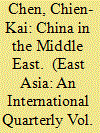

|
|
|
|
|
| Summary/Abstract |
There is an ongoing debate about whether China’s growing economic presence in the Middle East will eventually make it more politically assertive on the Middle Eastern affairs. This paper demonstrates, from a theoretical perspective of “path dependence,” that China’s promotion of the “Five Principles of Peaceful Coexistence” since the 1950s as the guiding doctrine of its foreign relations has forged a “path” for China to follow, along which it has made and repeated promises against interventionism and imperialism to other countries including the Middle Eastern ones. It, in turn, has created a situation where moving away from that “path against interventionism and imperialism” will cause huge damage to China’s reputation as a reliable non-interventionist partner to the Middle Eastern countries, and the “Global South” in general. As a result, China has refrained, and will arguably continue to refrain, from being too politically assertive on the Middle Eastern affairs.
|
|
|
|
|
|
|
|
|
|
|
|
|
|
|
|
| 2 |
ID:
080310
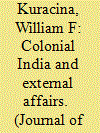

|
|
|
|
|
| Publication |
2007.
|
| Summary/Abstract |
This essay relates the Indian National Congress's struggle against British imperialism to the global politics of the mid-1930s. While contextualizing the Congress's anti-colonialism as a world view intending to combat imperial systems of exploitation, this article postulates that the foreign policy of the post-colonial Indian state originated in the Congress's anti-imperialism and anti-fascism of the 1930s. Drawing on published sources that chart policy decisions and illustrate the attitudes of leading actors in the formulation of official policy, this article hypothesizes that the principles generated by inter-war exigencies proved to be incompatible ideologies for the construction of India's post-colonial foreign policy
|
|
|
|
|
|
|
|
|
|
|
|
|
|
|
|
| 3 |
ID:
177698
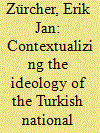

|
|
|
|
|
| Summary/Abstract |
The national resistance movement that emerged in Anatolia and Thrace immediately after the end of World War I and that was eventually successful in overturning the peace settlement imposed on the Ottoman Empire by the victorious Entente, has become such an important part of the history of the emergence of the Turkish nation state, that it is studied almost exclusively in that context: as republican prehistory. As a result almost no effort has been made to locate it within the major global developments of the era. This article tries to remedy this by analysing statements coming out of the resistance leadership over the years 1918-1921 to establish where it fits the ideological currents of the day. It concludes that four major inputs can be discerned: loyalty to the Ottoman monarchy and state; Muslim nationalism; Wilsonian self-determination, and Boslevik-inspired anti-imperialism. These influences were not mutually exclusive. Apart from being influenced by contemporary ideological currents, the National Movement was also an influencer: as a movement to preserve an existing state (and not to create or carve out a new one) it was also a pioneer of the revisionist movements of the interbellum that aimed to undo the Paris peace arrangements.
|
|
|
|
|
|
|
|
|
|
|
|
|
|
|
|
| 4 |
ID:
192315
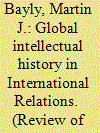

|
|
|
|
|
| Summary/Abstract |
The Eurocentric critique of the International Relations discipline has brought welcome attention to non-European international thinkers, and anti-colonial or anti-imperial thinkers in particular. Frequently these thinkers and associated movements are rightly described in thematic terms of emancipation, equality, and justice, in opposition to the hierarchical worldview of empires and their acolytes. Notwithstanding the broad validity of this depiction, a purely oppositional picture risks obscuring those aspects of ‘non-European’ international thought that evade simple categorisation. Drawing upon archival material and historical works, this article applies approaches offered by global intellectual history to the works of late colonial Indian international thinkers, exploring the mixed registers of equality and hierarchy, internationalism and imperialism present in their writings. Concentrating on three ‘sites’ connected by the common themes of diaspora and mobility: the plight of Indians overseas in East Africa; the concept of ‘greater India’; and the international political thought of Benoy Kumar Sarkar, the article complicates the internationalism/imperialism divide of the early twentieth century, showing how ostensibly opposed scholarly communities sometimes competed over similar forms of knowledge and ways of ordering the world. This offers a framework by which the contributions of global intellectual history can be applied to the study of international political thought.
|
|
|
|
|
|
|
|
|
|
|
|
|
|
|
|
| 5 |
ID:
174158
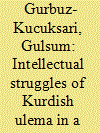

|
|
|
|
|
| Summary/Abstract |
Modern Kurdish thought encompasses many factions with diverse social, political, religious and ideological positions in and outside of Turkey.1 While our knowledge about the evolutions of the nationalist thought among Kurdish secular intellectuals has radically increased, the intellectual heritage of Kurdish religious intellectuals, the ulema, who have been searching for the best ways of delivering their societies from internal and external exploitations, have been mostly overlooked in Western academia. This article aims to bring to light the intellectual wrestling of a Kurdish mullah, Ali Zile of Diyarbakır, with the problems he believed Kurds faced from many angles: sheikhs, the passive madrasa tradition, the Kurdish secular/Marxist nationalism from the inside, and the Turkish nationalism and the Western imperialism from the outside.
|
|
|
|
|
|
|
|
|
|
|
|
|
|
|
|
| 6 |
ID:
192293
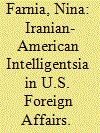

|
|
|
|
|
| Summary/Abstract |
This article challenges the anti-structural and ahistorical turn in recent histories of the Iranian Revolution. Tracing the genealogy of this anti-structural turn to the publication of Foucault’s writings on Iran, the author argues that the continued decline of US-Iran relations, coupled with hostility toward anti-imperialist scholarship in US academia, has created the conditions for an ahistoricism in US-based scholarship on Iran. This turn is further exacerbated by the lack of accessible archives to enable rigorous analyses of the Revolution. The article concludes by distinguishing between an intellectual, one who challenges the status quo to create a more just world, and a functionary, whose scholarly contributions are guided by the precepts of foundation funding and the State Department. Ultimately the article calls for a transformation in Iranian Studies toward radical intellectualism.
|
|
|
|
|
|
|
|
|
|
|
|
|
|
|
|
| 7 |
ID:
186910
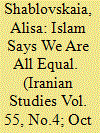

|
|
|
|
|
| Summary/Abstract |
The early 1920s witnessed an upsurge in Soviet interest in Islam on an international scale. This interest was to a large extent guided by Great Game logic, at a time when the idea of Islamic jihad against the British was extremely popular all over the Middle East. Contrary to the common assumption that the Marxist rationale of the Bolsheviks excluded any possibility of integrating religion into Soviet policy, the highest authorities in Moscow adopted a rather opportunistic position with regard to Islam both at home and abroad. Drawing mainly on Russian archival sources, this study questions the origins and nature of the Islamic turn in Soviet discourse, diplomacy, and propaganda in Iran. The article concludes that although the Soviet rapprochement with some members of the Iranian clergy and the integration of religious elements into communist propaganda were carried out for the sake of short-term geopolitical goals, these maneuvers were much conditioned by Soviet domestic policy and post–World War I regional interdependencies.
|
|
|
|
|
|
|
|
|
|
|
|
|
|
|
|
| 8 |
ID:
188190
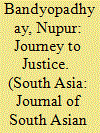

|
|
|
|
|
| Summary/Abstract |
Ramnath Biswas (1894–1955) independently travelled around the world on a bicycle between 1931 and 1940. His travelogues about Africa and the US reveal Biswas to be an active supporter of the nascent transnational civil rights movement. This article connects his endeavours to achieve social justice for African, African American and Asian people with the phenomenon of ‘coloured cosmopolitanism’. Biswas’ observations—in particular, his portrayal of racial dynamics between Indians and Africans—are striking. Exploring Biswas’ narratives from a micro-historical perspective allows us to envision an alternative history of solidarity between non-white (‘oshwet’) people and to place his journey at the intersection of Indian Ocean Studies and studies of transnational civil rights activities during the inter-War period.
|
|
|
|
|
|
|
|
|
|
|
|
|
|
|
|
| 9 |
ID:
130705
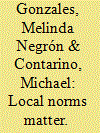

|
|
|
|
|
| Publication |
2014.
|
| Summary/Abstract |
Most states have embraced the emerging Responsibility to Protect norm, which was adopted by the UN General Assembly in 2005. R2P obliges states to prevent atrocity crimes within their own borders and not to turn a blind eye when they occur elsewhere. However, R2P's third pillar, which permits UN Security Council-authorized coercive actions, has been controversial. A few states have rejected R2P, fearing that the third pillar might be misused, while others have localized R2P (adapting it to their own preferences) or have sought to modify it globally through feedback in continuing UN discussions. This article explains the range of responses to the third pillar of R2P and explores why states employ different types of feedback, ranging from soft feedback (which seeks to build broader support for R2P) to hard feedback (which seeks to limit R2P). The article concludes that feedback reflects both national strategic concerns and preexisting local norms. Prior normative commitments to human rights and humanitarianism reduce the incidence of hard feedback whereas normative commitments to anti-imperialism and noninterference increase the likelihood of feedback seeking to constrain R2P. States with mixed commitments (e.g., to both human rights and to anti-imperialism) may offer complex, even contradictory, feedback, reflecting a prevailing national norm hierarchy, changes to which could result in changed state responses to R2P.
|
|
|
|
|
|
|
|
|
|
|
|
|
|
|
|
| 10 |
ID:
173440
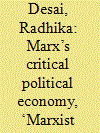

|
|
|
|
|
| Summary/Abstract |
Most revolutions against capitalism have occurred in ‘backward’ and Third World societies, and they have divided and disarrayed Marxisms in the West. One key reason, this paper argues, is intellectual. When, long ago, Marxists surrendered to the bourgeois challenge to Marx – neoclassical economics – developing, in place of Marx’s critical political economy, a ‘Marxist economics’, they lost touch with Marx’s analysis of capitalism as contradictory value production. That analysis could illuminate how capitalism’s contradictions drive its imperialist expansionism and how and why resistance to it must, equally necessarily, take national forms. As a result, major currents of Marxism in the West either have paid attention to imperialism and anti-imperialist resistance but without Marx’s analysis of capitalism as contradictory value production or have insisted that their (mistaken) conception of Marx’s analysis implies that capitalism has no necessary connection with imperialism. Neither tradition can actually develop Marxism to comprehend the actual historical record of revolutions since Marx’s time. Neither can inform new mobilisations against capitalism, whether in or outside its homelands. It is high time we return to Marx’s analysis of capitalism as value production and develop it.
|
|
|
|
|
|
|
|
|
|
|
|
|
|
|
|
| 11 |
ID:
159321
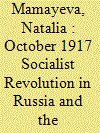

|
|
|
|
|
| Summary/Abstract |
China experienced the strongest influence of Russia during the years of the October 1917 Revolution and the postrevolution period. An important role in China was played by the ideological and cultural impact of Russia on the New Culture Movement in the country (1915-1925), on whose basis the May Fourth Movement (1919) developed, and an upsurge of the revolutionary movement in China in 1925-1927. A study of the ideological and cultural aspects of the interaction and influence of Marxism-Leninism on China focuses on the common actions of the two sides on the spheres of ideology, culture, and democracy, and demonstrates the specific features of historical process in China.
|
|
|
|
|
|
|
|
|
|
|
|
|
|
|
|
| 12 |
ID:
163837
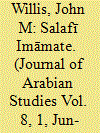

|
|
|
|
|
| Summary/Abstract |
This article reassesses the reign of Imām Yaḥyā Ḥamīd Al-Dīn (r. 1904–48), the historiography of which has emphasized its perceived political, economic, and intellectual isolation. In contrast to this view, this article situates the rise of Imām Yaḥyā and the formation of the Mutawakklite Kingdom of Yemen in interwar movements of anti-imperialism and moral reform that were global in ambition and reach. Rather than remaining isolated from broader political and intellectual trends, Imām Yaḥyā actively engaged the reformist project of the Sunnī-salafī movement through the growing medium of the trans-regional Arabic press and the post-Ottoman associational life of the interwar Muslim congresses.
|
|
|
|
|
|
|
|
|
|
|
|
|
|
|
|
| 13 |
ID:
155134
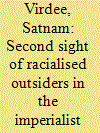

|
|
|
|
|
| Summary/Abstract |
This essay focuses attention on a current of socialist internationalism within imperial Britain and the formative role played by racialised outsiders of Irish Catholic, Jewish and Indian descent in actualising anti-racism and anti-imperialism. The collective memories of colonial subjugation combined with their outsider status within Britain itself endowed them with a second sight that enabled them to see through the usual fog of blood and belonging and act as a leavening agent connecting the struggles of workers of different ethnicities within Britain, as well as with those beyond. The essay concludes with a call to accommodate the emancipatory potential of the racialised outsider position in critical theory and practice. In particular, if contemporary Marxism is to remain relevant, it must be stretched to accommodate the specificity of racism and anti-racism without reducing it to class. The lessons for political practice appear equally compelling: emancipatory politics today need to accommodate how identifications of race are materially inscribed social realities which can facilitate resistance against racism. In that sense, socialist political practice will have to be more intersectional if a sustainable solidarity is to be forged between the ethnically diverse proletariat in the imperialist core, as well as with those beyond.
|
|
|
|
|
|
|
|
|
|
|
|
|
|
|
|
| 14 |
ID:
157086
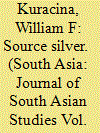

|
|
|
|
|
| Summary/Abstract |
This paper examines Indian socialist ideals that transcended India's Independence in 1947. It introduces a Delhi Police Special Branch confidential informant, ‘Source Silver’, who monitored socialist activities in 1946 and 1947—a peculiar situation in which the conduct of socialist Congressmen was scrutinised by Congressmen in office. The essay also highlights the precise continuity of socialist ideals which originated within the first few years of the Congress Socialist Party's founding and continued after Independence. Likewise, it suggests that these ideals proved ill-suited to the Interim Government period from September 1946 up to the eventual transfer of power in August 1947, a misalignment which prompted Congress socialists to separate from, or have their separation engineered by, the Indian National Congress in early 1948.
|
|
|
|
|
|
|
|
|
|
|
|
|
|
|
|
| 15 |
ID:
155133


|
|
|
|
|
| Summary/Abstract |
From the writings of Lenin, the guerrilla activity of Che Guevara, the anti-racism of the Black Panther Party and the Third World’s plan for a New International Economic Order, the idea of imperialism and the politics of anti-imperialism were a mainstay of political vernacular throughout most of the twentieth century. Yet, with the onset of neo-liberal globalisation in the Global North and, most importantly, in the Global South the idea of imperialism has seemingly disappeared or been deemed irrelevant. This special issue draws on a range of theoretical contributions that use the prism of imperialism to explore the strengths and limits of classical Marxist theories of imperialism; the relationship between Marxist, post-colonial and de-colonial approaches; imperialism and social movement theory; and the strengths of returning to ideas of Black Marxism and Pan-Africanism in the midst of contemporary neo-imperialism. These theoretical debates are in turn complemented by the collection exploring the idea of imperialism from different empirical vantage points in the Global North (Europe, US) and Global South (Africa, the Caribbean, Cuba and Kashmir). The issue thus provides both theoretically and empirically innovative interventions on how we should conceptualise and approach the idea of imperialism in the twenty-first century.
|
|
|
|
|
|
|
|
|
|
|
|
|
|
|
|
|
|
|
|
|